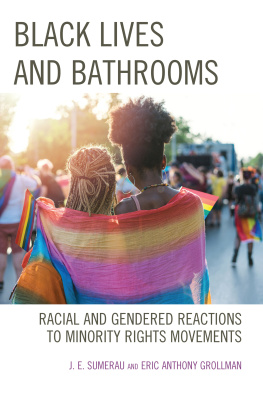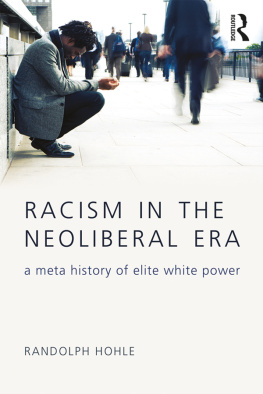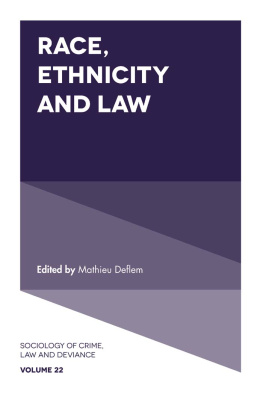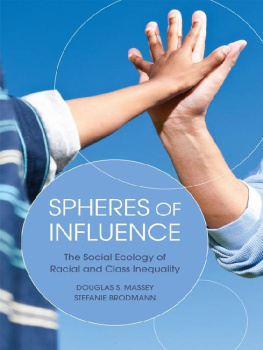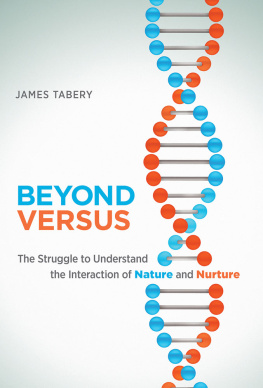I N THE PAST 25 YEARS, MANY INDIVIDUALSFAMILY, FRIENDS, COLLEAGUES , and mentorshave encouraged me to write about race, even its most difficult and sensitive aspects. I am grateful for their support and inspiration. I am deeply indebted to Dr. Audrey Smedley, the late Dr. Leonard Lieberman, and the late Dr. ONeil Ray Collins for their professorial guidance as internationally renowned scholars of race. Dr. Smedley and Dr. Lieberman, as well as Alvin Poussaint, MD, provided valuable feedback on some of my earlier publications on the nature versus nurture debate about ethnic population differences in social behavior. Special thanks go to Irwin Zucker, Jennifer Ferro, Michael Lynton, Earl Ofari Hutchinson, Ph.D., and Rabbi Mordecai Finley, Ph.D., for their professional insights and for appreciating the need to candidly discuss race in society. I also am especially grateful to Vernon and Antionette Hickman, Ann Collins, Zoltan Soos, and Ty Stoller for their stimulating conversation, which helped make this book a reality. Finally, I want to thank the production team at Rowman & Littlefield for their diligent attention to this project. Nicole Carty provided valuable copyediting support, and Jessica McCleary assisted in managing the phases of book production.
T HE O RIGIN OF N ATURE VERSUS N URTURE
T HE AGE-OLD DEBATE ABOUT NATURE VERSUS NURTUREWHETHER INTELLIGENCE , personality traits, and behavioral tendencies are mainly innate or learnedcan be traced back to antiquity. In the ancient world, this debate was birthed long before nineteenth-century Austrian monk and scientist Gregor Mendel conducted his famous pea experiments demonstrating that dominant and recessive inherited traits are passed from parents to offspring.
Some of the great thinkers of the ancient world also paid close attention to the impact of experience, loosely known as nurture, on the psychological disposition and qualities that shape the human mind. Greek philosopher Plato claimed that the Guardiansthe ruling elite of ancient Greek societyrequired both good ancestry and instruction, or learning, to achieve the ideal state. Plato acknowledged heredity, but his advocacy of universal education for the citizens of his state, starting at an early age, became an endorsement of the environment in shaping well-rounded individuals, no matter their background.
In the modern era, the roots of the nature versus nurture debatesometimes framed as genetics versus environmentare linked with Charles Darwin and John Locke. For Darwin, the famed nineteenth-century English naturalist whose theory of biological evolution was broadened to include social behavior, nature prevailed, but for John Locke, the seventeenth-century English philosopher and physician, nurture triumphed. Locke was an influential, antiauthoritarian thinker of the Enlightenment, and his writings on human equality had a profound effect on politics, notably the American and French revolutions. As an architect of the politics of liberalismthe belief in individual freedom and libertyLocke had a major impact on such historic figures as Jefferson, Voltaire, and even Rousseau, who supported self-determination and self-government rather than aristocracy.
Befitting the empiricist tradition, Locke envisioned the human mind as a tabula rasa, or blank slate, that at birth was empty of any thoughts or ideas. He believed that each person acquired knowledge through sensory perception of his exposures to the outside world, or his personal experiences in life, rather than through innate imprinting. Yet, despite Lockes liberal philosophy of natural rights and human freedom, he was not, say some sources, a pure nurture advocate, at least in a contemporary sense. Locke doubted that characteristics of the mind were ingrained at birth, but at the same time he proposed that humans have native propensities, including innate capacities and temperaments, toward power, for example, that vary from one individual to another.
Historically, Locke has often been portrayed for his patent opposition to slavery, expressed in many of his writings. And yet as an investor in the Royal African Company, one of the premier African slave mercantile companies of his era, he earned appreciable income as a merchant adventurer in the early transatlantic slave trade. Locke even helped draft state legislation that upheld the rights of Carolina freemen, essentially white men, to have absolute power and authority over their slaves. For some historians, Lockes support for black enslavement and a feudal aristocracy was the epitome of hypocrisy.
In the seventeenth-century British Empire, including the American colonies, Native Americans were considered natural men inhabiting primitive surroundings, whereas African negroes were seen as subnatural or subhuman. The prevailing thinking of the day was that Native Americans potentially could be educated but blacks could not. Regardless of his exact perspective on African blacks, Locke was not alone in his contradictory stances regarding slavery. Other Enlightenment thinkers too have been accused, and rightly so, of inconsistencies between their personal approval of black enslavement and their public appeal for human (or least white male) freedom.
These contradictions were part and parcel of the political, intellectual, and economic elite of the day. Virtually everyone in Victorian England and its empire accepted an uncontested view of the innate superiority of whitesspecifically those of Northern and Western European descentand with that belief, yielded to a blind allegiance to notions of innate race-based differences in intelligence and social patterns. This may be why some scholars have questioned if Locke truly were hypocritical with regard to African black enslavement. Yet, Locke stood apart from many of his contemporaries and even some of his intellectual successors in how he conceived of racial differences. He believed that individuals could be differentiated by not only their education, but also their race, temperament, mental capacity, and habit. Steeped in the traditional European worldview of the 1700s, he suggested that a persons racial background could influence how he was affected by life experiences.
Locke crafted an argument that, although embryonic at the time, may well have laid the groundwork for the concept of nature plus nurture, or the interaction between biology and environment that was to emerge decades, even centuries, later. Despite the conflicts between Lockes public sentiments about freedom and his private actions regarding slavery, he had a momentous impact on future liberal thinkers. Ironically, some abolitionists in the United States interpreted, perhaps naively, perhaps fancifully, Lockes words to mean that environmental circumstances rather than biological inheritance best explained racial differences in the social accomplishments of whites and Negro slaves. This may be one reason why even today, John Locke remains an iconic champion of the idea that nurture, or life experience, is decisive in shaping a persons character and productivity in society.
A century later, in the mid-1800s, John Stuart Mill, an English liberal political philosopher and intellectual protg of Locke, became an even stronger proponent of nurture than Locke. Mill challenged aristocratic privilege, arguing that opportunity was more important than birth in determining life outcomes. Mill was a contemporary of Darwin and, more importantly, Darwins cousin, Sir Francis Galton. As an early pioneer of intelligence testing, Galton was a staunch supporter of nature over nurture. Known for his mastery of multiple scholarly fields, Galton gained recognition as a poly-math with widespread expertise. When he coined the phrase, nature versus nurture, intellectuals took note, just as they did when he announced his research on individual psychological differences and the comparative worth of different races.



